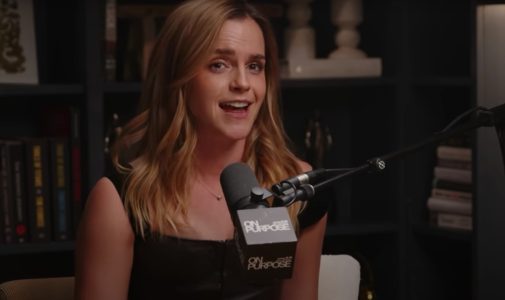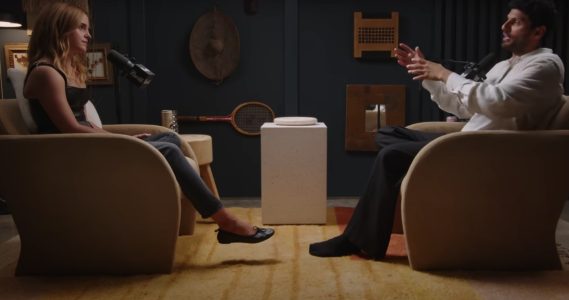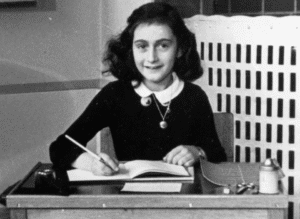 Pin
Pin Emma Watson / Photo source: Youtube – Jay Shetty Podcast
You know how sometimes you have those conversations that stick with you for days? The kind where someone drops their guard completely and suddenly you’re hearing things you never expected? That’s exactly what happened when Emma Watson decided to do something she’d never done before: sit down for a real, no-holds-barred podcast chat.
On September 24, 2025, Watson spent nearly three hours talking with Jay Shetty on his “On Purpose” podcast, and honestly, it felt like eavesdropping on a therapy session (in the best possible way). This wasn’t Emma promoting a movie or giving carefully rehearsed answers about her latest project. This was Emma at 35, figuring out who she is when the cameras stop rolling and the crowds go home.
The whole thing happened because Watson reached out to Shetty herself, basically saying “Hey, can we talk?” There’s something refreshing about that spontaneity. Here’s someone who’s spent most of her life having conversations scheduled and scripted for her, finally choosing to just… have a real talk. What came out of that studio was raw, funny, sometimes uncomfortable, and absolutely fascinating. It’s the kind of interview that makes you realize even famous people are just trying to figure life out, one messy conversation at a time.
Table of Contents
Why This Chat Felt So Different
 Pin
Pin Emma Watson / Photo source: Youtube – Jay Shetty Podcast
Here’s the thing about Emma Watson – she’s been doing interviews since she was basically a kid, but she’d never done a podcast before. Think about that for a second. After all these years of red carpets and talk shows, she chose this format for her first real deep dive into personal territory. That tells you something right there.
The whole vibe was different too. Instead of those quick TV segments where you get maybe ten minutes to touch on surface-level stuff, Watson and Shetty settled in for almost three hours of actual conversation. No commercial breaks, no producers frantically signaling to wrap things up, just two people talking like you might with a really good friend over coffee. Watson even mentioned that she reached out to Shetty directly, which feels so much more genuine than the usual publicity machine booking these things months in advance. It’s like she woke up one day and thought, “You know what? I actually have stuff to say, and I want to say it properly.”
The Marriage Question That Hit Everyone Right in the Feels
When Jay asked Emma about marriage and dating, she didn’t just give some fluffy answer about “when the right person comes along.” Instead, she completely flipped the script and talked about how messed up it is that society basically bullies young people into getting married before they even know who they are.
Her exact words? She called the pressure to marry “such a violence” and “such a cruelty” on young people, especially women. That’s not celebrity-speak – that’s someone who’s clearly thought hard about this stuff and isn’t afraid to say what needs saying. She talked about how we make people feel worthless if they haven’t “succeeded” at finding someone by a certain age, which is honestly pretty brutal when you think about it. Watson was basically saying what a lot of us feel but maybe don’t have the guts to say out loud: that rushing into marriage just because you’re “supposed to” is actually the least romantic thing ever. She even admitted that if she’d tried to get married before about a year ago, it would have been “carnage” because she simply didn’t know herself well enough yet.
Love Isn't What Disney Taught Us
Emma got brutally honest about how Hollywood completely warped her understanding of what love actually looks like. She admitted that growing up watching Disney movies and romantic comedies gave her this totally unrealistic picture of relationships – you know, the whole “love at first sight and then you live happily ever after” fantasy that we’ve all been fed since childhood.
But here’s where it gets interesting. Watson talked about how falling in love might actually be the easy part. The real challenge? Finding someone who wants to do the actual work of partnership with you. She broke it down in such a real way, asking questions like “Can you argue well together? Is your conflict actually productive? Can you make each other feel emotionally safe?” These aren’t exactly the romantic questions that make it into movie scripts, but they’re the ones that actually matter when you’re trying to build a life with someone. She even got super practical, talking about things like responding to text messages quickly enough that your partner doesn’t spiral, but not sending so many that you overwhelm them. It’s like she took all the messy, unglamorous parts of real relationships and said “This is what actually matters.”
Dating When Everyone Thinks They Know You
Can you imagine trying to date when literally millions of people think they know who you are based on characters you played as a teenager? Emma opened up about how weird and sometimes crushing it is to navigate romance when your “avatar” walks into every room before you do.
She described this jarring experience of watching someone’s entire behavior change the moment they realize who she is. One minute you’re having a normal conversation with someone, and the next minute they’re treating you like a completely different person. She called it “dehumanizing,” which honestly sounds about right. But here’s what I found kind of sweet – she mentioned that she actually loves it when people apologize for not having seen her movies. To her, that’s like music to her ears because it means she gets to just be Emma, not Hermione or whatever other character people associate with her. She talked about how brutal dating is for everyone these days, which made her feel like she’s in good company with the rest of us struggling through dating apps and awkward first meetings.
The J.K. Rowling Situation - How to Love Someone You Disagree With
This was probably the most delicate part of the entire conversation, and Emma handled it with so much grace. When Jay brought up her relationship with J.K. Rowling, especially considering their very different views on transgender rights, Watson didn’t throw anyone under the bus or try to dodge the question.
Instead, she talked about something really beautiful – how you can still love and appreciate what someone gave you in the past while completely disagreeing with their current positions. She mentioned that she wishes a real conversation between them had been possible, which suggests there’s some sadness there about how things played out publicly. Watson seemed to be advocating for this idea that people are complex, relationships are messy, and you don’t have to throw away all the good someone did for you just because they’ve taken positions you can’t support. It’s such a mature way to handle what could have been a really explosive topic. She basically modeled how to hold space for complexity in relationships, even when the stakes are high and the public is watching every word.
Why She Stepped Away from Acting (And What She's Doing Instead)
Here’s something that surprised a lot of people – Emma talked openly about why she decided to step back from the acting world that made her famous. It wasn’t some dramatic falling out or scandal. She just realized that the constant work was leaving her feeling completely ungrounded and disconnected from herself.
She mentioned that while she doesn’t miss the commercial, business side of Hollywood, she does miss the creative aspects. But here’s the cool part – she’s not just sitting around feeling sorry for herself. Watson’s actually pursuing a creative writing master’s degree at Oxford, which is pretty incredible when you think about it. She’s literally going back to school to explore a completely different kind of creativity. She even wrote and performed a play about her own experience transitioning from being this full-time actress and activist to trying to live a more normal life as a student. She shared it with family, friends, and apparently even shows it to new people she’s dating as a way to help them understand her journey. There’s something both vulnerable and practical about that approach – like she’s using her art to bridge the gap between her public persona and her private self.
The Reality of Growing Up Famous
Emma didn’t sugarcoat what it’s been like to essentially grow up in public. She talked about the weird disconnect that happens when your sense of self gets all tangled up with the roles you play and the public persona you’re expected to maintain. It’s like she had to figure out who Emma Watson actually is separate from all the characters and causes that defined her for so long.
What struck me most was how she talked about embracing vulnerability and imperfection as essential parts of personal growth. For someone who spent years being seen as this perfect role model, that’s got to be both terrifying and liberating. She mentioned wanting to create art that feels deeply personal and authentic, rather than just meeting external expectations. It sounds like she’s in this phase of life where she’s finally giving herself permission to be messy, to not have all the answers, to be a work in progress. There’s something really refreshing about a celebrity being honest about the fact that fame can mess with your head and that finding your authentic self takes real work, especially when millions of people think they already know who you are.
What "Want" vs "Need" Means in Relationships
One of the most profound things Emma shared came from advice her mother gave her about relationships. Her mom told her that you should want to be with someone, not need them. That might sound simple, but when you really think about it, it’s pretty revolutionary.
Emma explained that for most of her adult life, she probably would have entered relationships from a place of need – needing someone to complete her, to make her feel whole, to fill gaps in her sense of self. But now, at 35, she feels like her life is complete and whole on its own. If she chooses to be with someone, it would be because she genuinely wants them in her life, not because she needs them to feel okay about herself. She described it as the difference between desperation and choice, between filling a void and adding richness to something that’s already good. It’s such a healthy perspective on relationships, and probably explains why she’s been so intentional about staying single while she figures herself out. She basically said that five years ago, she wasn’t the woman who could love from that place of wholeness, but she feels like she’s getting there now.
The Loneliness and Beauty of Self-Discovery
Emma was surprisingly open about how isolating the process of self-discovery has been. She talked about sitting with herself in real discomfort, asking difficult questions that don’t have easy answers. This isn’t the glamorous version of “finding yourself” that we see in movies – this is the messy, sometimes lonely work of actually figuring out who you are when you strip away all the external validation and expectations.
She mentioned that this process has involved a lot of uncomfortable honesty with herself about times when she wasn’t truly happy or healthy, even when everything looked perfect from the outside. There’s something brave about admitting that success and fame don’t automatically equal fulfillment. Watson seems to be in this phase where she’s learning to be okay with not having everything figured out, with being a work in progress, with the fact that growth often feels awkward and uncertain. She talked about how this work has been necessary preparation for any future relationship – like she needed to know who she is before she can truly share her life with someone else.
Her Current Chapter - Oxford, Writing, and New Beginnings
The Emma Watson we’re seeing now is someone who’s actively choosing a different kind of life. Instead of jumping from one high-profile project to another, she’s taken this amazing step of going back to school for creative writing at Oxford. There’s something both humble and bold about that choice – humble because she’s putting herself back in student mode, bold because she’s pursuing something completely different from what made her famous.
She mentioned that part of her studies involves exploring her own story through writing, including that play about her transition from actress to student. It’s like she’s using academic structure to help her process this major life change, which is pretty smart when you think about it. Watson talked about how this feels like the beginning of a new chapter where she gets to define success on her own terms, create art that feels meaningful to her personally, and build relationships based on who she actually is rather than who the public thinks she should be. She’s basically modeling what it looks like to choose authenticity over external validation, even when that choice might seem risky or unexpected to everyone watching.
What This All Means for the Rest of Us
Here’s what makes Emma Watson’s interview so compelling – it’s not just celebrity gossip or promotional content. It’s someone who grew up in extraordinary circumstances grappling with fundamentally human questions about identity, love, purpose, and authenticity. Her insights about marriage pressure, the complexity of relationships, and the importance of self-knowledge aren’t just relevant to famous people.
Watson’s journey from child star to thoughtful adult offers something valuable for anyone trying to figure out who they are beneath all the roles they play and expectations they carry. Her honesty about the messiness of personal growth, the loneliness of self-discovery, and the courage it takes to choose your own path resonates far beyond Hollywood. She’s basically giving us permission to take our time, to prioritize self-understanding over external timelines, and to believe that it’s never too late to choose authenticity over what’s expected. In a world that often pressures us to have everything figured out by a certain age, Watson’s willingness to be publicly uncertain and still growing feels like a gift. She’s showing us what it looks like to be brave enough to disappoint people in order to stay true to yourself.
FAQs
This was Watson’s first-ever podcast interview, lasting nearly three hours with no commercial breaks or time pressure, allowing for genuinely deep conversation.
She believes societal pressure to marry makes people feel worthless if they haven’t found someone by a certain age, which she finds cruel and unromantic.
She’s pursuing a creative writing master’s degree at Oxford and wrote a play about her transition from actress to student life.
She finds it challenging when people’s behavior changes after recognizing her, calling it “dehumanizing,” but appreciates when people don’t know her work.
Watson expressed sadness that a real conversation wasn’t possible, while maintaining that you can appreciate someone’s past contributions despite disagreeing with their current views.
































